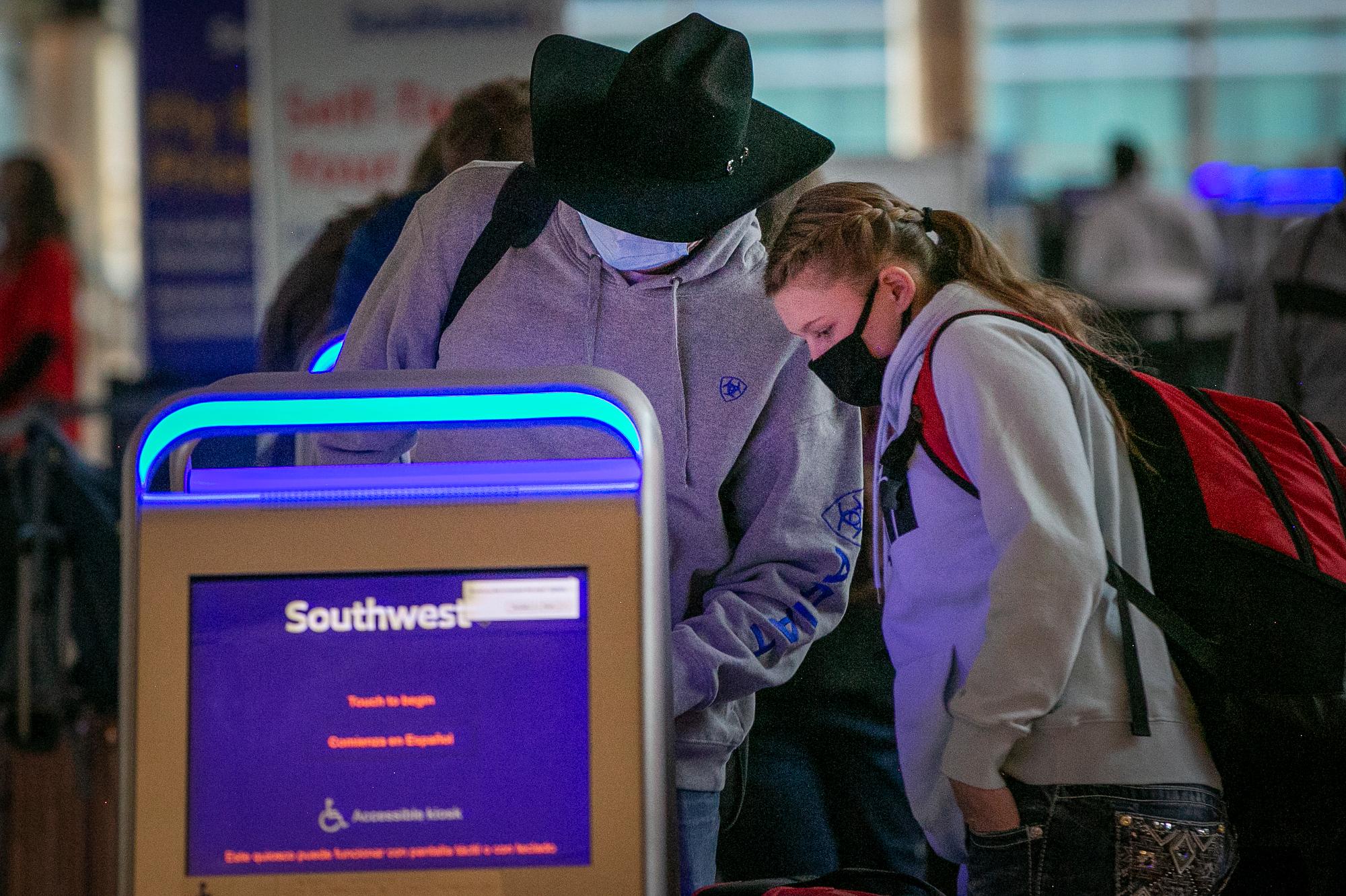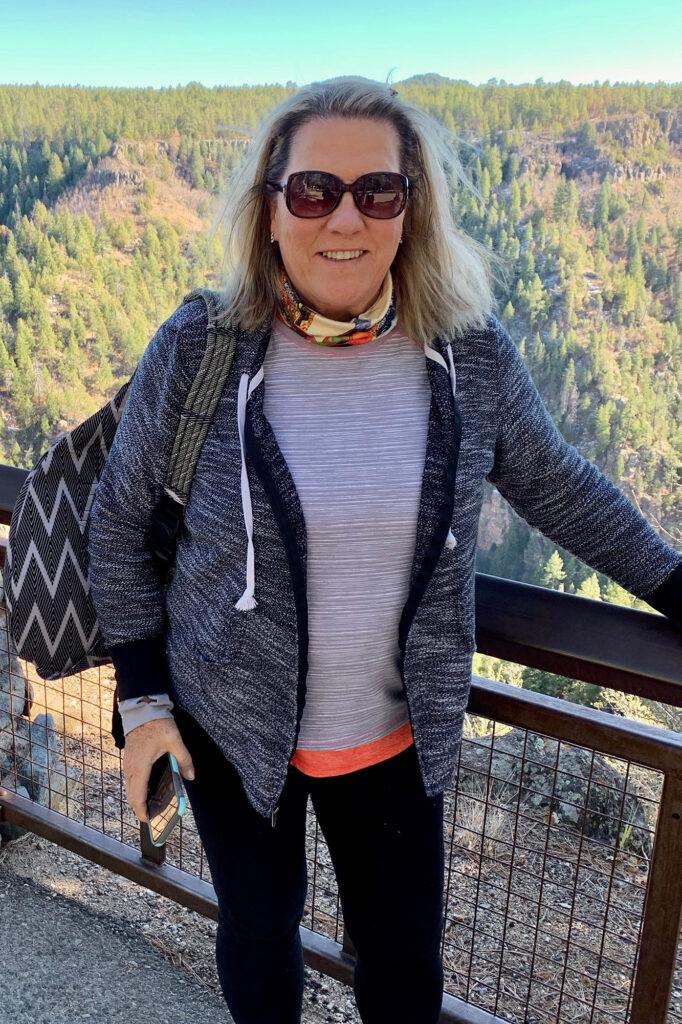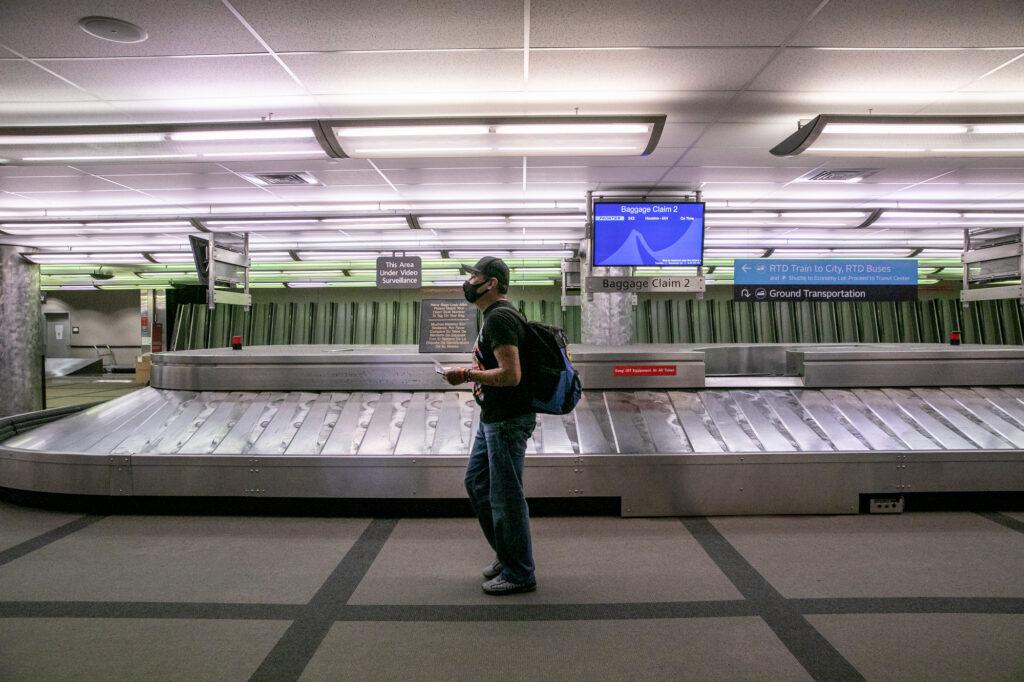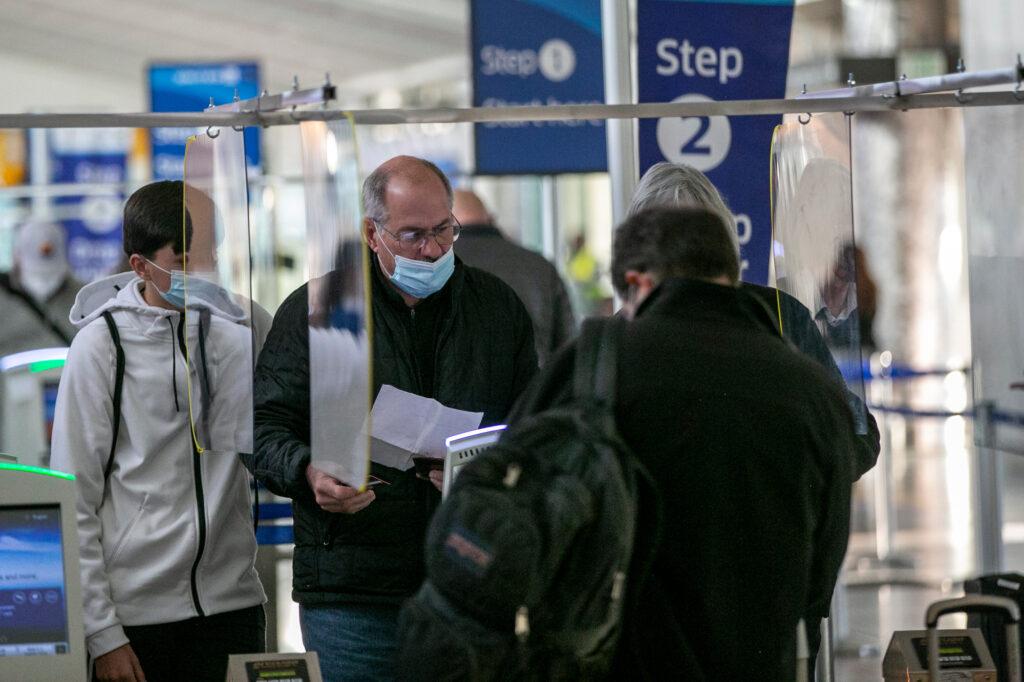
- Severe restrictions: No indoor dining, earlier last call for 20 Colorado counties
- Stimulus package: Colorado's special legislative session on Nov. 30 to address coronavirus relief
- Denver Broncos: No more in-person fans at home games after this weekend
On Nov. 1, with the pandemic surging, Susie Fricona was traveling from Wisconsin to Phoenix, with a stop at Denver International Airport. As she made her way through the concourse, watching other passengers, she was shaken.
“I was appalled,” at the lack of infection control, even though most people at least had masks, Fricona said.
“I was like, ‘Oh no, look at this. Oh man,’” she said.
Fricona, a retired nurse living in Arizona, was startled to see that passengers, while they were wearing masks, were not keeping a distance from each other — nothing close to the six feet urged by federal guidelines. And there seemed to be little visible messaging and no enforcement from the airport.
The DIA strategy for preventing viral spread through the honor system seemingly had no honor.
“There was no compliance, every line for the McDonald's, and every line for Panda Express, or any kind of a food line,” Fricona said. “Or even getting onto the airplane, it was, I’d say, one foot apart.”

Those concerns are elevated with Thanksgiving coming up. It’s among the busiest travel times on the calendar. This year it comes as coronavirus transmission, cases and hospitalizations are taking off like a 737. Despite that, DIA spokeswoman Alex Renteria says the airport expects Thanksgiving travel to be down by only 36 percent from 2019.
The Sunday before and Sunday after Thanksgiving Day are projected to be the busiest days, with around 50,000 people projected to move through the checkpoints on Nov. 29. That’s expected to be “our busiest day since mid-March,” she said.
On Thursday, the Centers for Disease Control and Prevention recommended that Americans avoid traveling for Thanksgiving to prevent the spread of COVID-19.
Renteria said face coverings are required at DIA. Passengers can buy one at concessions and vending machines. She says airlines require passengers to wear a mask on board and there are hand sanitizers throughout the airport, as well as decals on the floor and announcements urging social distancing.
“We are leading through an educational approach,” she said. “People are following the rules. However, if there was an individual who did not want to follow that there is Denver police on site who would issue a citation.”
No citations have been issued by Denver Police.
A police spokeswoman said when officers encounter someone who isn’t wearing a mask at the airport, they educate them on the order.
Social distancing isn't easy at DIA
But beyond enforcement, some travelers say social distancing is virtually impossible in one heavily traveled route through the airport. In October, Kurt Papenfus, an emergency room doctor in rural Colorado, came through DIA, taking the train to the main terminal.
“There are people literally like inches from me and we're all crammed like sardines in this train and I'm going, ‘Oh my God, I am in a super spreader event right now,’” he said.
He estimates he spent 15 to 20 minutes in a crowd funneled through the train up the escalator to baggage. Though people wore masks, “with the construction at the airport right now, you can't just run away and get away from those people ... herding altogether in a big little herd with all your COVID from all over the country,” he said.
A week after that, Papenfus tested positive and then was hospitalized with COVID-19. He suspects he caught it at DIA. Papenfus said he has now filed a complaint with the airport and written to Gov. Jared Polis and Denver Mayor Michael Hancock.
"As it stands, DIA is an extremely dangerous place," reads Papenfus' letter. "This an extremely dangerous problem that needs to be addressed immediately."
The airport’s spokeswoman declined to comment about Papenfus’ experience.
But, to avoid crowds, Renteria urges people to walk over the sky bridge to Concourse A, where they can then take the train to the B and C concourses after some of its passengers have disembarked. But there is no way to walk to the two outlying concourses, and no alternative to the train.
Even buses, which would have to pass through areas where planes move about, would be impractical and expensive, and, without more aggressive enforcement than DIA has implemented so far, buses might not have any better infection control than the trains anyway.
“That would require a lot of buses,” Renteria said. “Think about 50,000 people passing through checkpoints. Think about how many buses that would require.”
She said to help with crowding, DIA added more trains “so there are more trains coming every two to three minutes.”
Renteria said DIA also recently launched a new system that aims to allow a passenger to minimize interactions as they move through the airport. With the VeriFLY app, a passenger can reserve a specific time to enter a dedicated TSA screening lane, pass through a touchless, electronic gate and access a reserved train car with a limited number of VeriFLY travelers. Renteria said that ensures a socially distanced ride to the concourses.

As coronavirus cases rise, health officials say the safest way to travel may be to not
The holiday travel season arrives as Colorado struggles to contain the pandemic. The state has revamped its color-coded warning system, while hospitals are seeing record hospitalizations and concerns are rising about staffing shortages. On Wednesday, according to state data, there were 1,428 hospitalizations. That’s more than 250 patients more than a week earlier and nearly 10 times the number from two months ago.
Denver’s public health director said the city has discussed with airport leadership ways to spread people out at the airport, including on and around the train. But spreading people out in one spot could lead to bottlenecks elsewhere.
“You could have a problem with people backing up, waiting to get on the plane ... congregating for longer periods of time than if they just got on the train,” said Bob McDonald, executive director of Denver’s Department of Public Health and Environment.
Meanwhile, public health officials think there’s a better path.
“We would strongly recommend that individuals reconsider their travel plans at this point,” said Dr. Rachel Herlihy, the state’s epidemiologist.
She said the virus is highly transmissible, and in some parts of the state, one in 50 or 60 people is currently infectious.
If traveling by train, bus or plane, Herlihy said “you are going to run into many more people than that and your chances of being exposed to COVID-19, and potentially bringing the virus with you to your loved ones, is quite high.”
Herlihy also warned about testing and false negatives, saying that even if you got a negative COVID-19 test before travel you could still be sick and pass the virus along.
“A test result is really just a snapshot. So if you have a test result done today, that means you are negative today. It does not mean that you are negative tomorrow or the day that you get your test result back,” Herlihy said. “It's particularly risky if individuals continue to have exposures after they are tested. We also know that tests are not perfect."
“I'd say that testing as a sole strategy ahead of holidays is really a pretty risky strategy,” she said.

Airline industry workers are getting sick
The overall risk of air travel was spotlighted with news that a TSA agent, who worked at DIA’s security checkpoint, died this week of COVID-19. An agency spokeswoman says it is not known where he contracted it.
Officer Eduard Faktorovich, 49, will be remembered with a moment of silence and the playing of Taps in a noon ceremony Friday at the north TSA checkpoint at the airport.
On a conference call with reporters Thursday, TSA Administrator David Pekoske said 2,981 TSA employees nationwide have tested positive for COVID-19 since March, and 557 people of them have not yet recovered, with nine deaths. DIA has had 64 cases among TSA workers since the start of the pandemic, including one death, and 61 of those agents were screening officers who dealt with the public.
Also, about 100 air marshals have tested positive for COVID-19, according to recent reports.
Dr. Mark Johnson, a longtime county public health director in Jefferson County and president-elect of the Colorado Medical Society, said flying on the plane is just one part of the trip.
“The bigger problem is getting to the airport, getting through security, getting to the airplane, getting on the airplane,” Johnson said. “It's not so much sitting on the airplane. It's all of the other things that are involved with the travel that I'm concerned about.”
Because of how air circulates and is filtered on airplanes, most viruses and other germs don’t spread easily on flights, according to the CDC. But social distancing is difficult on crowded flights, and sitting within six feet of others, sometimes for hours, may increase the risk of getting COVID-19.
The agency urges travelers to think about how they get to and from the airport, since public transportation and ridesharing can also increase the chances of being exposed.
Back on the phone from Arizona, Susie Fricona says she currently has no air travel plans, especially through Denver, based on the lack of distancing she saw.
“I wouldn't get near it. I personally would not, I would not want my family traveling at that time at all through DIA,” Fricona said.








